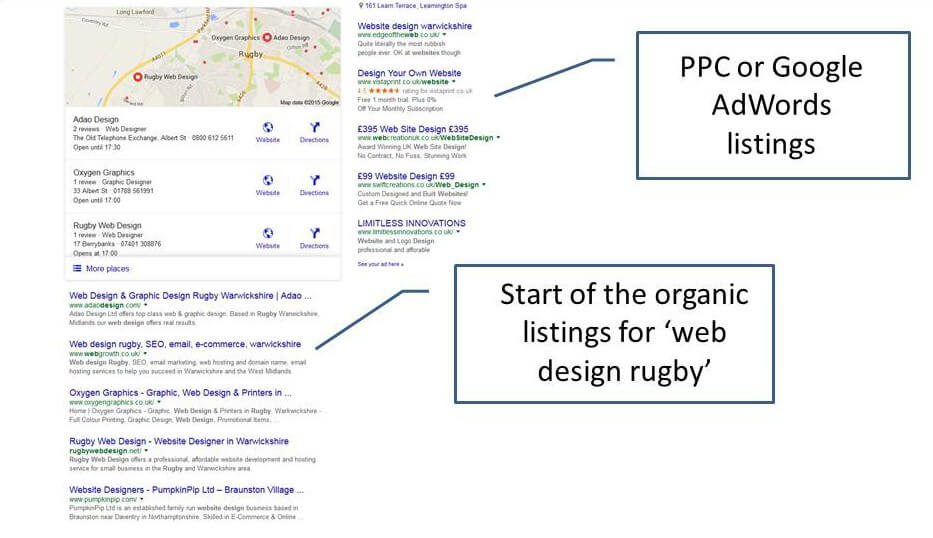Most people running a website would like to find just a few key SEO (search engine optimization) actions that can help catapult their website to the top of the rankings on Google, Bing, Yahoo and other search engines. Real life is rarely that straightforward and to do this effectively there are potentially many actions you can take to improve your rankings with little obvious short term effect, but will bear fruit longer term. It’s therefore easy to get a little paranoid when a short term blip in data distracts from longer term improvements so after recent posts about SEO ranking factors lets look at some common SEO conspiracy theories about search engines and Google in particular.
Investing in Google AdWords or PPC boosts organic rankings
This is an old one and simply not true. You can launch a well funded Google AdWords campaigns and attain top paid positions but this has no effect on your organic search positions. Google relies too much on good user experience to allow short term commercial gains to taint the more valuable benefits of matching peoples’ search queries accurately and quickly. This is Google’s stated position:
Investment in paid search has no impact on your organic search ranking. Google maintains a strict separation between our search business and our advertising business.
Source: Measuring paid & organic search results
For example, we are based in the town of Rugby and we often see companies based outside Rugby running paid search campaigns triggered by phrases such as ‘web design rugby‘ or other geographical keyword combination. It would be a poor user experience for someone looking for a local web developer based in Rugby to be presented with organic search results featuring web design companies based outside the town. This is despite a large investment in paid advertising.
There are, however, positive by-products of investing Google AdWords or PPC advertising:
- The quality score and approval process for AdWords will force you to improve your website landing pages.
- A 2012 study by Google showed that on average “half of the search ad clicks that occur with a top rank organic result are incremental, meaning that visits to the advertiser’s site from the ad clicks are not replaced by organic clicks when the search ads are paused” i.e. traffic gained from running ads is extra – adding on to the organic traffic for the most part and probably independent. (see Impact Of Ranking Of Organic Search Results On The Incrementality Of Search Ads)
- A New York University study concluded that “positive interdependence leads to an increase in expected profits for the firm ranging from 4.2% to 6.15% when compared to profits in the absence of this interdependence.” In other words, you make more money from visitors when both paid and organic listings appear together (see NYU study on Google paid vs organic search).
- Using AdWords to advertise your brand/your website may increase brand searches, and thus, increase organic searches and traffic from people who recall your brand name.
- Using AdWords to advertise your site’s good content can result in increased incoming links to that content, which will result in improved organic rankings for relevant phrases.

Position of paid vs organic search results
Google is de-prioritizing organic rankings
Although they make billions from paid search and nothing from organic search, the principles of relevant search results still hold true. That said, a 2013 article on Search Engine Land, “Are Google’s Results Getting Too Ad-Heavy & Self-Promotional?” relays information on a study that found organic results “made up from 0-to-13% of a Google search results page.”
The layout of the Google search results pages has indeed changed over the years so the top organic listings are pushed further down the page after the top paid search and local search results. Therefore, as much as we like to be cynical about conspiracy theories, this might actually have an element of truth.
Google wants to dictate what is “true”
Unless you personally buy into their particular version of events, conspiracy theorists the world over such as holocaust deniers, climate change sceptics, moon landing doubters etc can keep the rest of us amused with claim and counter clam – see David Aaronovitch‘s book Voodoo Histories: The Role of the Conspiracy Theory in Shaping Modern History for a rigorous debunking of the worst and a fair assessment of some where there is an element of truth. The self-publishing principles of the Internet fuel these conspiracy communities and they are currently running scared of Google stated desire to feature “factually accurate websites and, from that, deciding which results to return for consumer searches.”
The fear is that non-traditional ideas or interpretations of events will effectively be written out of the conversation if they fail to meet Google’s model of truthfulness. For example, if they deem that anti-vaxxer sites are not true, the anti-vaxxer argument will be eliminated from results and thereby dictate the truth about the impact of vaccinations. This is currently research (see Knowledge-Based Trust: Estimating the Trustworthiness of Web Sources for the original paper) but the ‘birther’ insanity around Barack Obama’s true birthplace highlight the issues where biased politics could lead to misinformation in the organic Google search results and a diminished user experience. Health issues are commonly searched on Google and it would be irresponsible for Google to feature prominently homoeopathic cures for cancer over the medical consensus.
We suspect that Google is indeed heading in this direction and will not be afraid to challenge the noisy minority.
Get in touch with Dinesh on 07941 686113 or visit our web design rugby home page or submit our enquiry form.
Further reading:
Dissecting Google Conspiracy Theories
The huge implications of Google’s idea to rank sites based on their accuracy
Why some people are so terrified by the idea of a Google truth machine





